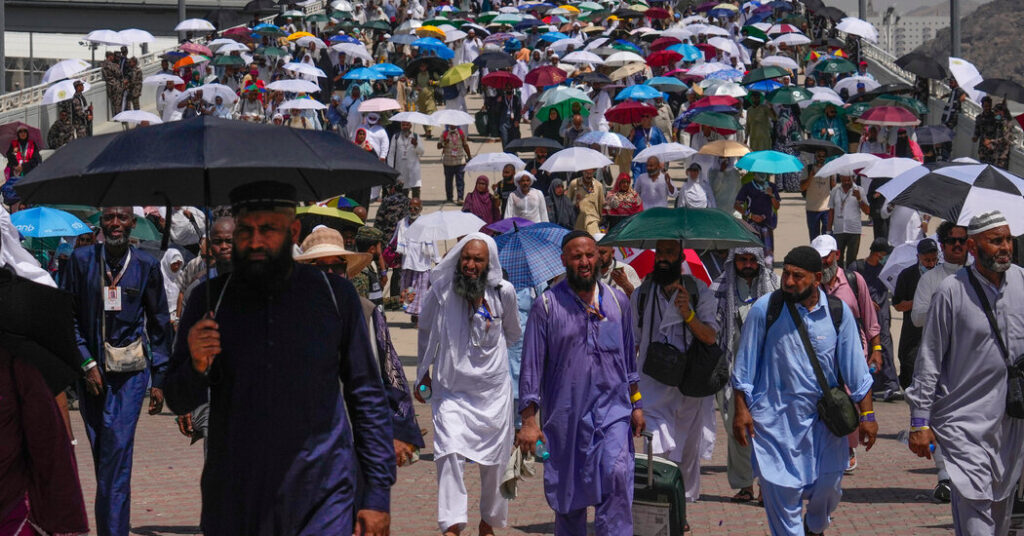The deaths of more than 1,000 pilgrims in Saudi Arabia have shone a spotlight on an underworld of illegal travel agencies, smugglers and scammers who profit from Muslims rushing to fulfill their religious obligations and travel to Mecca.
While registered pilgrims are transported around the shrine in air-conditioned buses and rest in air-conditioned tents, undocumented pilgrims are often exposed to the elements, making them more susceptible to the sweltering heat. This year, some pilgrims described seeing people fainting and bodies passing in the streets as temperatures reached 120 degrees or higher.
On Sunday, Saudi Health Minister Fahd al-Jalajel said in an interview with state television that more than 1,300 people had died, 83% of them pilgrims without official permission.
“Rising temperatures during the Hajj season are a major challenge this year,” he said. “Unfortunately – and this is painful for all of us – those who do not have a Hajj permit are traveling long distances under the sun.”
Before Jalajel’s comments, Saudi authorities had remained silent on deaths during the hajj.
With nearly 2 million pilgrims taking part in the hajj each year, many of whom are elderly or sick, it is not uncommon for people to die from heat stress, illness or chronic illness, and Saudi Arabia does not regularly report these statistics . So it’s unclear whether this year’s death toll is unusual. A study at the time found that 774 pilgrims died in Indonesia alone last year, compared with more than 1,700 deaths around the holy site in 1985, most from heat stress.
But because many of the pilgrims who died this year were performing the hajj without official documents, their deaths exposed an underworld of unlicensed tour operators, smugglers and scammers who took advantage of pilgrims eager to perform the pilgrimage and help them evade regulations.
“This industry is rife with greed,” said Iman Ahmed, a partner at El-Iman Tours in Cairo.
Ms Ahmed said she refused to send unregistered pilgrims on hajj packages, but other Egyptian tour operators and Saudi brokers were making good money doing so.
This year, more than 1.8 million pilgrims have officially registered to participate in the Hajj. But a senior Saudi official, speaking on condition of anonymity, told AFP that around 400,000 people were also trying to travel without the required documents. That means nearly a fifth of pilgrims this year have bypassed Saudi Arabia’s restrictions, including the security cordon around Mecca that was cordoned off in the weeks leading up to the hajj.
Some countries that have experienced large numbers of pilgrim deaths in the past few days have moved quickly to address the problem.
In Egypt, authorities said they would revoke the licenses of 16 companies that issued “unofficial” visas to hopeful pilgrims without providing them with adequate services.
In Tunisia, where the death toll passed 50, the president fired the country’s minister of religious affairs on Friday.
In Jordan, at least 99 pilgrims have died and prosecutors have launched an investigation into illegal hajj routes and those who profit from them.
Hajj travel agencies, pilgrims and relatives of the deceased told The New York Times that the number of undocumented pilgrims appears to be growing due to growing economic difficulties in countries such as Egypt and Jordan. A formal Hajj package can cost more than $5,000 or $10,000, depending on the pilgrim’s country of origin, which is well beyond the financial means of many who wish to make the Hajj.
But they also describe easily exploited loopholes in Saudi Arabian regulations that allow undocumented pilgrims to travel to the country on tourist or visitor visas in the weeks leading up to the hajj. Once they arrive, they say, they find a network of illegal brokers and smugglers who service them, take their money and sometimes abandon them, leaving them to fend for themselves.
Saudi officials did not respond to requests for comment.
Safaa al-Tawab from the Egyptian city of Luxor is one of those who fell into this trap.
Ms. Tawab, 55, was unable to obtain a hajj permit, but she found an Egyptian tour company willing to take her there for about $3,000, her brother Ahmed al-Tawab explain.
He said she did not understand she was breaking the rules when she traveled to Saudi Arabia last month.
Upon arrival, she told relatives that she was being housed in inadequate housing and that the travel agency would not allow her to leave. Mr Tawab said that while the company promised to provide air-conditioned buses to transport pilgrims around Mecca, she found herself walking for miles in the sun to reach the holy site.
His sister died during the pilgrimage, but when he contacted the tour company, he was assured she was fine. Tawab said a company representative turned off his phone when he learned her relatives knew about her death.
“Pilgrims are being deceived,” Mahmoud Qasim, a member of Egypt’s parliament, said in a request for information from government officials.
“They leave them alone to face their fate,” Mr. Qasim said of the tour companies.
Reporting contributed by Hager ElHakeem, Lana F. Welding, Zia-ur-Rehman, Saif Hasnat, Mujib Mashal, Shafaq Timur, natural aida and Muktita Suhartono.

